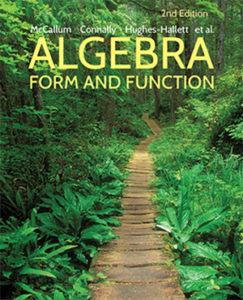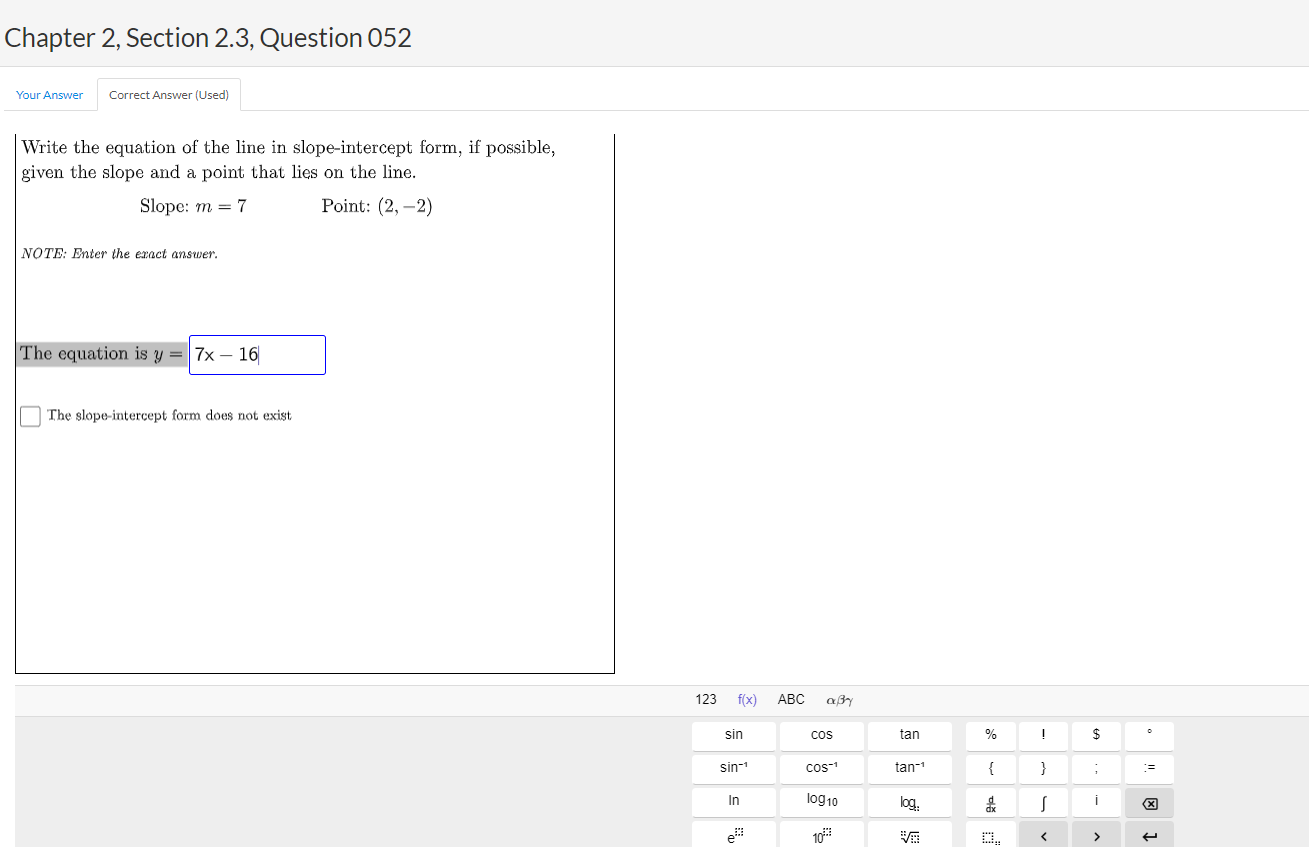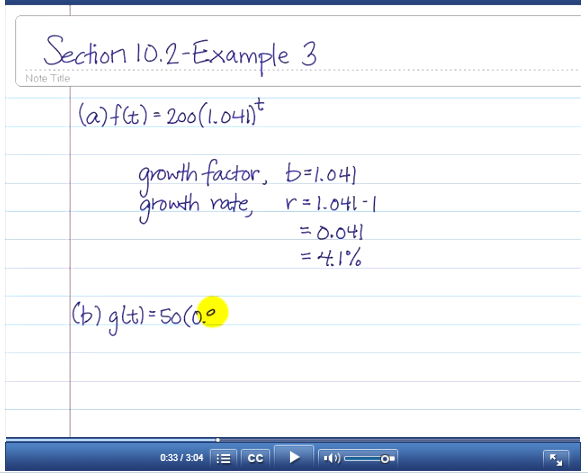
Algebra: Form and Function, 2nd Edition
By William G. McCallum, Eric Connally, Deborah Hughes-Hallett
Algebra: Form and Function, now with corequisite support content, offers a fresh approach to algebra that focuses on teaching students how to truly understand the principles, rather than viewing them merely as tools for other forms of mathematics. Designed for a college algebra course, the text covers algebraic equations that describe the laws of science, the principles of engineering, and the rules of business. The power of algebra lies in the efficient symbolic representation of complex ideas, which also presents the main difficulty in learning it. Most students rely on surface knowledge of algebraic manipulations without understanding the underlying structure of algebra that allows them to see patterns and apply it to multiple situations: Algebra: Form and Function focuses on the structure from the start.
Want to learn more about WileyPLUS? Click Here
New Corequisite Support Appendices
have been added as a digital appendix to support corequisite courses. The comprehensive coverage of prerequisite topics ranges from prealgebra through intermediate algebra, including step-by-step instructional worksheets that can be used inside or outside of the classroom, and an ample selection of homework and/or quiz exercises for each topic. Utilizing WileyPLUS, you can customize the corequisite topics and truly cater to your individual course needs.

Symbolic Palette Entry
New in WileyPLUS, symbolic palette and graphing questions powered by GeoGebra give instructors the ability to assign more complex auto-graded questions to improve conceptual understanding in math. Boost your homework assessments with flexible, accurate, and reliable symbolic palette entry and real-time manipulation of graphs.
WileyPLUS users will have best-in-class math assessment with unique features including:
– Randomization to ensure each student gets a different question
– Automatically marked questions with fully worked solutions
– Assessment of advanced math topics such as differential equations and matrices

Video Lectures
Video Lectures help students come to class better prepared. Mini-lecture videos linked to examples in WileyPLUS provide a greater detail to the solution of examples in each section of the text. These may assist students in reading the text prior to class or in reviewing material after class.
What’s New
- New Corequisite Support Appendices have been added as a digital appendix to support corequisite courses. The comprehensive coverage of prerequisite topics ranges from prealgebra through intermediate algebra, including step-by-step instructional worksheets that can be used inside or outside of the classroom, and an ample selection of homework and/or quiz exercises for each topic. Utilizing WileyPLUS, you can customize the corequisite topics and truly cater to your individual course needs.
- Symbolic Palette Entry is new in WileyPLUS. Symbolic palette and graphing questions powered by GeoGebra give instructors the ability to assign more complex auto-graded questions to improve conceptual understanding in math. Boost your homework assessments with flexible, accurate, and reliable symbolic palette entry and real-time manipulation of graphs.
- WileyPLUS users will have best-in-class math assessment with unique features including:
– Randomization to ensure each student gets a different question
– Automatically marked questions with fully worked solutions
– Assessment of advanced math topics such as differential equations and matrices
William G. McCallum is a University Distinguished Professor of Mathematics and Head of the Department of Mathematics at the University of Arizona. Born in Sydney, Australia in 1956, he received his Ph.D. in Mathematics from Harvard University in 1984, under the supervision of Barry Mazur. After spending two years at the University of California, Berkeley, and one at the Mathematical Sciences Research Institute in Berkeley, he joined the faculty at the University of Arizona in 1987. In 1989 he joined the Harvard calculus consortium, and is the lead author of the consortium’s multivariable calculus and college algebra texts. In 1993-94 he spent a year at the Institut des Hautes Etudes Scientifiques, and in 1995-96 he spent a year at the Institute for Advanced Study on a Centennial Fellowship from the American Mathematical Society. In 2005 he received the Director’s Award for Distinguished Teaching Scholars from the National Science Foundation. In 2006 he founded the Institute for Mathematics and Education at the University of Arizona. He was Director of the Institute until 2009 and now chairs its advisory board. In 2009-2010 he led the work team that developed the NGA/CCSSO Common Core Math Standards. His professional interests include arithmetical algebraic geometry and mathematics education.
Eric Connally began his teaching career at Harvard University in 1989, shortly after graduating from Cornell University with a BA in Physics in 1988. He joined Wellesley College as coordinator of its Quantitative Reasoning (QR) Program in 1995. At the time, this innovative program encompassed several new undergraduate degree requirements as well as a course in basic math and data analysis. Together with a colleague who joined the program in 1998, he administered all aspects of the QR program and the associated degree requirements. In 2000, Eric joined software startup Elytics, Inc. as a software engineer.
Eric is now Director of Engineering, working on a new online math project under development by several members of the Mathematics Consortium Working Group. He continues to teach math at the Harvard Extension School and at the Harvard Kennedy School. He was awarded the International Conference on Technology in Collegiate Mathematics (ICTCM) Award for Excellence and Innovation with the Use of Technology in Collegiate Mathematics and the Petra T. Shattuck Excellence in Teaching Award.
Deborah J. Hughes-Hallett is Professor of Mathematics at the University of Arizona. Her expertise is in the undergraduate teaching of mathematics. She has also taught as Professor of the Practice in the Teaching of Mathematics at Harvard University, and continues to hold an affiliation with Harvard as Adjunct Professor of Public Policy in the John F. Kennedy School of Government. Hughes-Hallett earned a Bachelor’s Degree in Mathematics from the University of Cambridge in 1966, and a Master’s Degree from Harvard in 1976. She worked as a Preceptor and Senior Preceptor at Harvard from 1975 to 1991, as an instructor at the Middle East Technical University in Ankara, Turkey, from 1981 to 1984, and as a faculty member at Harvard from 1986 to 1998. She served as Professor of the Practice in the Teaching of Mathematics at Harvard from 1991 to 1998. She moved to Arizona in 1998, and took on her adjunct position at the Kennedy School in 2001.
1: Functions and Algebraic Structure
2: Linear Functions
3: Quadratic Functions
4: Power Functions
5: More on Functions
6: Exponential Functions
7: Logarithms
8: Polynomial Functions
9: Rational Functions
10 Summation Notation (Online Only)
11 Sequences and Series (Online Only)
Appendix A: Expressions
Appendix B: Equations
Appendix C: Inequalities
Appendix D: Quadratics
Appendix E: Algebraic Fractions
Appendix F: Absolute Value
Appendix G: Exponents

